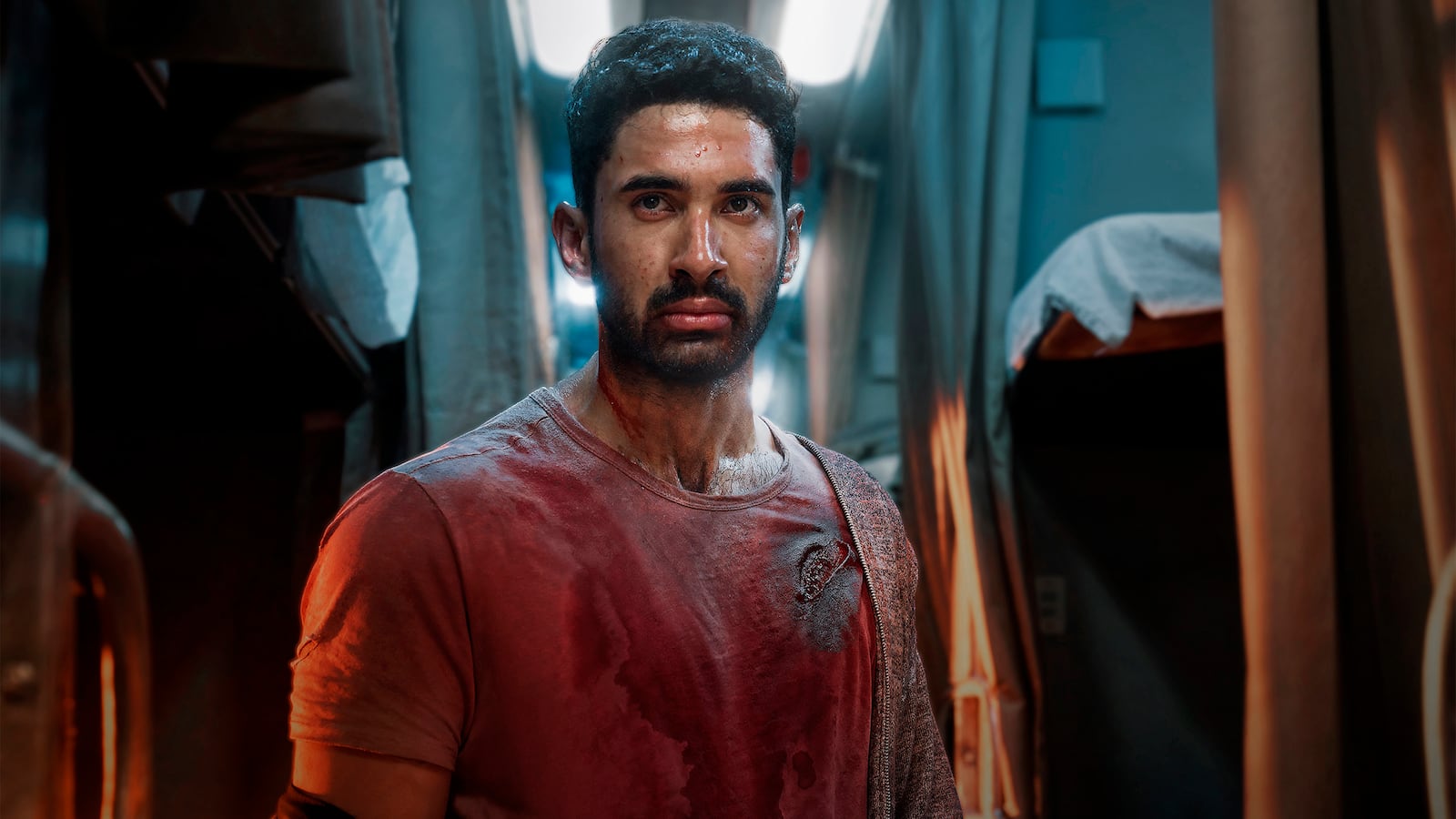Kill’s title card doesn’t arrive until the film’s 45-minute mark, at which point this delirious Indian action affair goes from being conventionally violent to jaw-droppingly, eye-poppingly, gasp-inducingly brutal. A no-holds-barred free-for-all that delivers exactly what it promises, Nikhil Nagesh Bhat’s feature has scant time for story and even less for character development. What it does boast, however, are brawls marked by the sort of viciousness that genre fans weaned on domestic (John Wick, Atomic Blonde) and foreign (The Villainess, Carter) bloodbaths have come to demand. Arriving in theaters on July 4 following its appearances at the Toronto, Sundance, and Tribeca Film Festivals, it’s a model midnight-movie beat-’em-up.
Amrit (Lakshya, in his big-screen debut) and his best pal Viresh (Abhishek Chauhan) are National Security Guard commandos and best friends,. After returning from their latest army mission, Amrit discovers that in his absence, his beloved girlfriend Tulika (Tanya Maniktala) has been forced by her father to accept another man’s marriage proposal. Upset by this news, Amrit attends the engagement party with the intention of running away with Tulika, but she balks at this plan. Far from dissuaded, Amrit subsequently tells Viresh that he’s not giving up on his and Tulika’s future because, “Bro, our love is much more powerful than her dad.” “What a line, Captain!” responds Viresh, undoubtedly because there’s nothing either of them likes more than starting each sentence with “bro.”
Amrit is a manly man whose every shirtless pose, intense stare, and turned head is accompanied by an over-the-top musical cue. In the wake of his failed attempt to elope with Tulika, he boards the evening train that she and her family—including teenage sister Aahna (Adrija Sinha) and dad Baldeo Singh Thakur (Harsh Chhaya), who’s a wealthy business magnate—are taking to Delhi. Out of the watchful eyes of her clan, Amrit proposes to Tulika in a bathroom, and she accepts. This should, in theory, create some conflict considering that Tulika is now betrothed to two different beaus, but Kill ignores those complications. The later revelation that Baldeo never knew about Amrit even though he’s been dating Tulika for four years (!) proves a similar bit of nonsensicality that’s never adequately explained.
This might matter if Kill were a romantic drama. Yet given that it’s not, such puzzling details are quickly drowned out by a tidal wave of carnage. Unbeknownst to its passengers, the train is packed with bandits whose boss Beni (Ashish Vidyarthi) is orchestrating things from a van at an upcoming stop. His lead crook is his son Fani (Raghav Juyal), a handsome if “scrawny” villain whose ruthlessness is dispensed with a taunting smile. Fani and his crew are initially interested in robbing the train’s passengers. However, upon learning that Baldeo is present, Fani changes plans and opts to kidnap the tycoon. This would be a smart move if not for the fact that Amrit and Viresh don’t take kindly to criminals, especially ones that are menacing their girlfriend’s relatives, and during an initial fight, Viresh kills Beni’s brother, thereby further enraging the baddies.
Once Beni joins Fani on the train and hears about his sibling’s death, the bandits go into full-on vengeance mode, and if their unjustified fury weren’t funny enough—they did, after all, start this entire sadistic affair!—their incessant weeping over the murder of their no-good comrades is the height of hilarity. Rarely have action-movie scoundrels shed so many tears as in Kill, rendering them a bunch of evil babies who deserve all the punishment they receive. As it turns out, that’s plenty, since Amrit is as lethal as he is handsome—a winning combination that the director plays up in a series of escalating set pieces.
Kill is rather straightforward for its first third and then, following a tragic slaying, goes absolutely bananas, with Amrit taking out adversaries in every conceivable manner. Unlike the jokiness of Bullet Train, Bhat stages his mayhem with ruthless grimness and, on a few occasions, unhinged goriness.

Lakshya in Kill.
Roadside AttractionsOften taking on multiple simultaneous attackers in cramped compartment walkways and bathroom vestibules, Amrit smashes one guy’s face in with a fire extinguisher, throws a dagger into another bandit’s mouth, slashes and stabs henchmen with a machete, bludgeons others with a sledgehammer, throws numerous men into walls and windows (as well as out of open doors), and snaps limbs in a variety of creative ways. No matter that he takes as many blows as he dishes out (with his fists, his feet, and his weapons), Amrit is an unstoppable assassin. Eventually, even his enemies begin thinking twice about continuing this foolhardy venture—not that they’re offered many chances to escape.
While mowing his way through these outlaws (who number in the forties!), Amrit strives to protect Tulika and her father as well as to save Aahna and Viresh, who’s in bad shape courtesy of these skirmishes. These threads are largely irrelevant but they do give some basic shape to Bhat’s script, which additionally boasts a subplot—involving a heavyset passenger who tries to aid Amrit in his cause—that takes a confusing twist and then is dropped without resolution. From a basic storytelling standpoint, Kill is melodramatic and a tad sloppy. Yet neither of those things diminishes its basic slam-bang muscle. Nor does the fact that Amrit recovers from his severe injuries with video game-esque speed; give him a few seconds to let his figurative health meter replenish, and he’s good as new!
By the time Amrit is stringing up corpses in a darkly lit car in order to transform it into a haunted house-style trap for Fani, Beni, and the rest of their accomplices (who all seem to be related), Kill has long since devolved into an R-rated cartoon about good and bad guys who are equally consumed with revenge. It’s only Fani, in fact, who’s motivated less by personal grudges than by wholesale greed, although that’s not enough to spare him from Amrit’s wrath. Taking its cue from myriad ’80s action blockbusters, it unashamedly has its hero proclaim about the bandits, “They'll get off this train for sure… but only for their funeral.” With that sort of cheeky attitude fueling its knockout bouts of chaos and cruelty, Bhat’s film earns its crimson-stained stripes.






